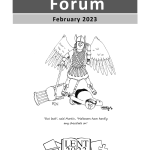webdev
Highley Forum – February 2023
Thought for the Week – 5th February 2023
Reminders of original sin?
This last week has seen the publication of another video showing a brutal attack by US police officers on a man they had just arrested. The officers apparently did not care that they were being filmed by their own body cameras. We have also had the testimony from a Russian officer of the torture of Ukrainian PoWs, in contravention of the Geneva Convention. It is not hard to see links between these isolated examples of inhumanity and the dreadful mass genocides that characterised the 20th century and which are also likely to feature in this century. At their root is the failure of the perpetrator to recognise his or her shared humanity with the victim. I would like to believe it is unthinkable that I could ever do this, but I am aware that the US police officers, the Russian soldiers, those who involved in mass genocides, quite possibly also considered themselves as moral and decent individuals; at least, at some stage in their life that is how they would have appeared. I was disturbed some years ago by a documentary about an idealistic Lutheran priest in Germany, who began by opposing the Nazi party but then freely joined the army at the outbreak of the Second World War and ended his life on the Eastern Front.
One of the more difficult concepts in Christianity is that of “original sin”; that we all have something dark within us. It has been misused to terrorise people. But at its core there is a warning we would all do to heed; we have the potential to do evil as well as good. I do not believe that I or any rational person I know would commit an atrocity. However, the best guarantee of that is if we constantly examine our own consciences. As a Christian, I must do that against the teachings of my faith, to see how often I fall short.
Rev David Poyner
Thought for the Week – 29th January 2023
The James Webb Telescope
There has been considerable discussion in recent weeks in the popular scientific press about the new discoveries coming from the James Webb telescope. This is a space telescope that uses special techniques (infra-red detection) to obtain images from objects that would be invisible from earth. It was launched in December 2021 and despite some problems, pictures are now flooding in; these can be seen by anyone with access to the internet (ESA – Webb). It has the ability to advance our understanding of the origins of the universe and to shed light on many other questions in astronomy. Very recently it has sent back pictures of a planet from another galaxy; this is the same size as our earth, although it is not clear if it has an atmosphere. As more earth-like planets are discovered, it becomes more and more likely that we are not the only life in the universe.
Some people may feel that their faith is threatened by new discoveries such as those made by the James Webb telescope; personally I am excited by them. There is no point in looking in the Bible for answers about the physical formation of the universe; scientific enquiry was not something that its writers would have known about and even if they had, I doubt it would have been much interest. They were curious about the relationship between God and ourselves, not beings on other planets. But they did grasp that God was, in some sense, creator and Lord of all the universe, even if they did not see any need to speculate how that actually worked out. It is more recent writers who have started to address this question. As we are still technically in the church season of epiphany until this coming Thursday, this gives me an excuse to reproduce the words of the late Sydney Carter’s carol, “Every star shall sing a carol”, which beautifully capture my response to the discoveries coming from James Webb.
Every star shall sing a carol!
Every creature, high or low,
come and praise the King of heaven by whatever name you know.
God above, Man below, holy is the name I know.
When the King of all creation had a cradle on the earth,
holy was the human body,
holy was the human birth.
God above, Man below, holy is the name I know.
Who can tell what other cradle,
high above the Milky Way,
still may rock the King of heaven on another Christmas day?
God above, Man below, holy is the name I know.
Who can count how many crosses,
still to come or long ago, crucify the King of heaven?
Holy is the name I know.
God above, Man below, holy is the name I know.
Who can tell what other body
he will hallow for his own?
I will praise the Son of Mary, brother of my blood and bone.
God above, Man below, holy is the name I know.
Every star and every planet,
every creature high and low,
come and praise the King of heaven by whatever name you know.
God above, Man below, holy is the name I know.
Rev David Poyner
Thought for the Week – 22nd January 2023
Families
As has been made very publicly and painfully obvious by the publication of a certain book, we cannot chose our relatives and there are often tensions within families. Whilst we talk about “brotherly love” and “the sisterhood”, I am sure we are all aware that the reality is sometimes rather different. It does not have to be open hostility; sometimes family members simply do not have much in common and so naturally lead separate lives. I am fortunate in that I had a close relationship with my parents and whilst I have no brothers or sisters, I am supported by cousins, aunts and uncles, but I am aware that this is not the case for everyone.
The Bible reflects this dilemma. The family, the household, was the building block of society, but the book is full of stories of brothers quarrelling, of mothers and daughters scheming or wronged. Paul talks about how all believers are members of God’s family, but it seems that there were times early in Jesus’s mission that his own family did not understand what he was doing. The Bible is honest about human ideals but also human failings. Perhaps a Christian perspective allows us to be honest about the relationships we have within our families; to accept failure with grace and to seek to love our relations, even if we do not always like them.
Rev David Poyner
Thought for the Week – 15th January 2023
Friendship
Last Thursday (12th January), the church remembered Aelred, abbot of Rievaulx Abbey in the 12th Century. He does not seem to have always been a terribly easy man to get on with; this is often the case with religious leaders. His writings can be difficult. In particular, he put friendship as a higher virtue than love. However, Christians are called to love everyone, including our enemies. In practice, this can mean that at best we remember those we do not like in our prayers or thoughts, perhaps through gritted teeth. By contrast, our friends are those whose company we seek, they are those for whom we have real love. As someone who lives alone, I am comfortable with my own company, but this is only because I am periodically energised by conversations and meetings with my close friends.
In John’s Gospel, the writer explores how Jesus, in the Last Supper, told his disciples that they were his friends, as he was their friend. The friendship that Jesus and Aledred were talking about is the highest form of love; perhaps I know this for only one or two people, but it is something that I cherish.
Rev David Poyner

